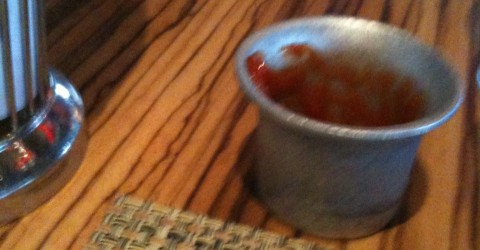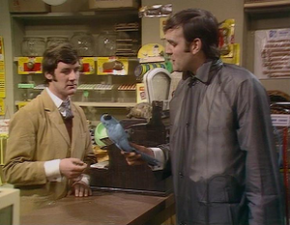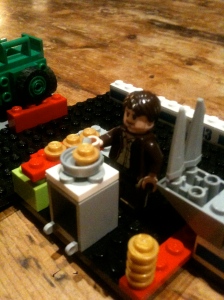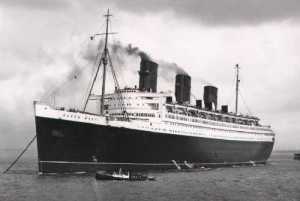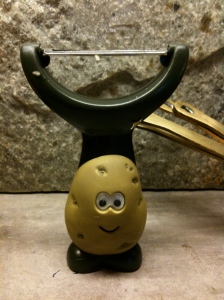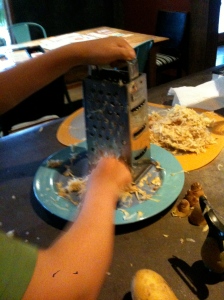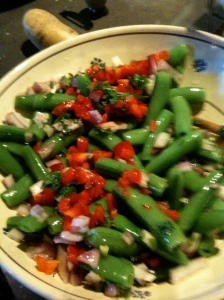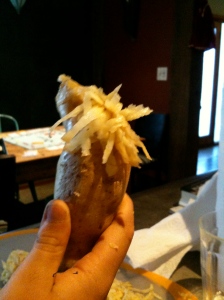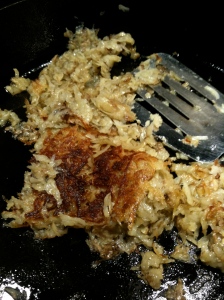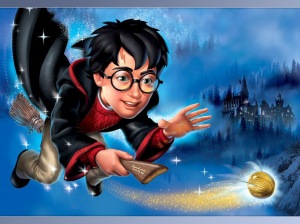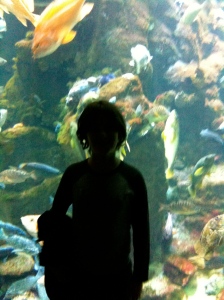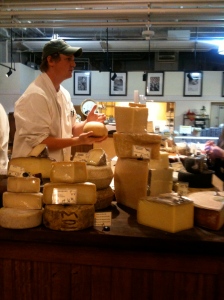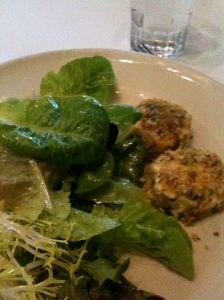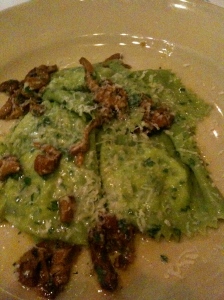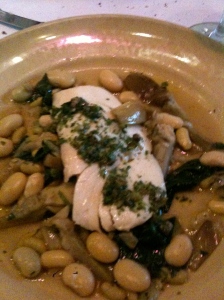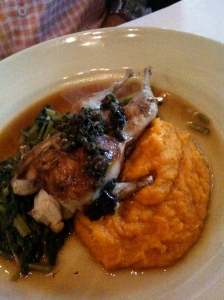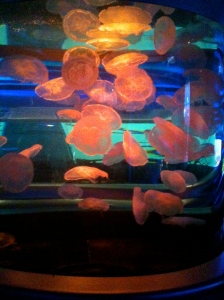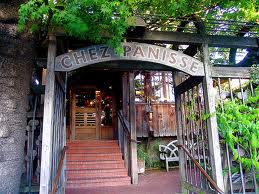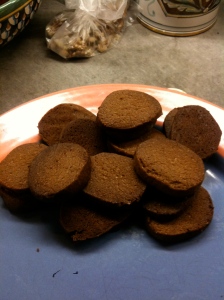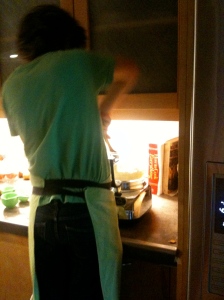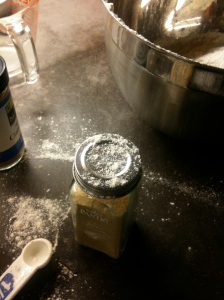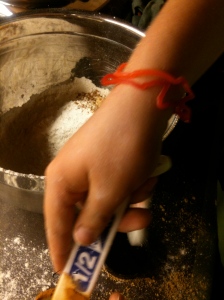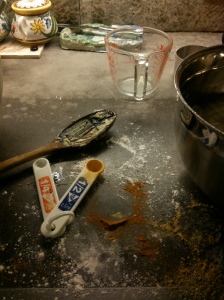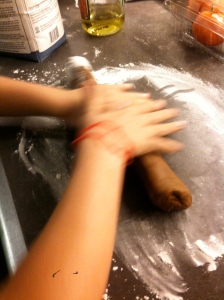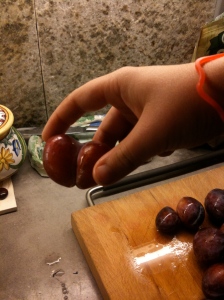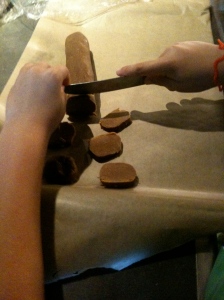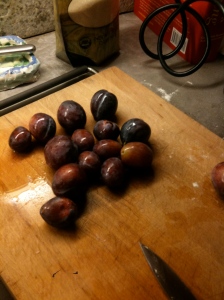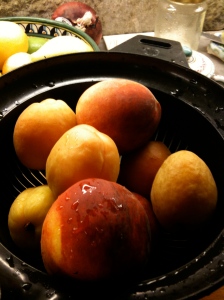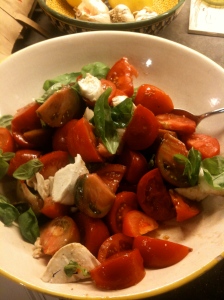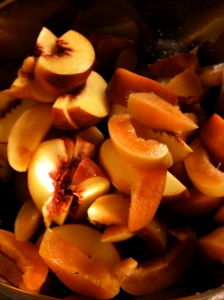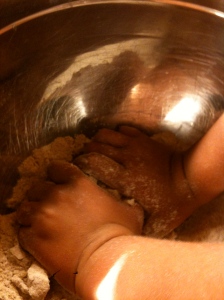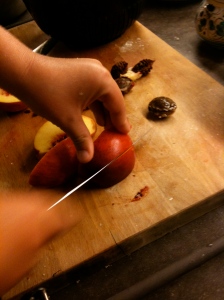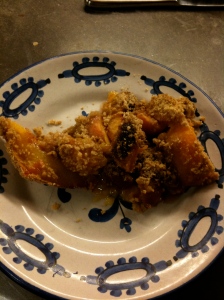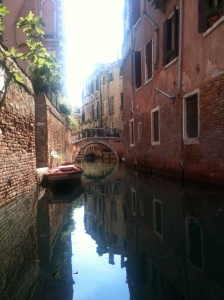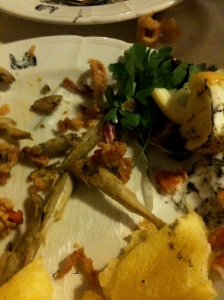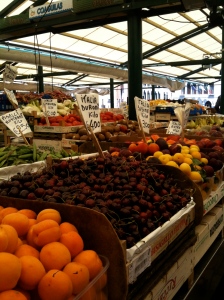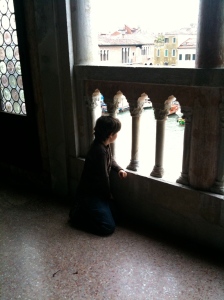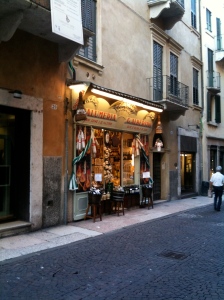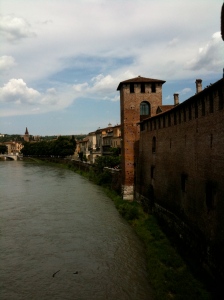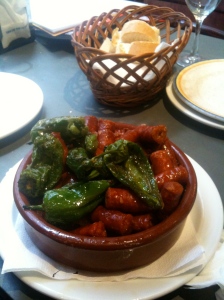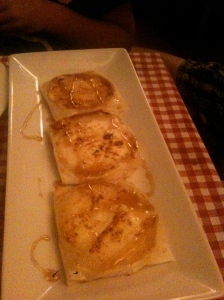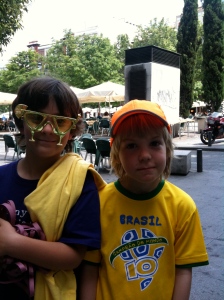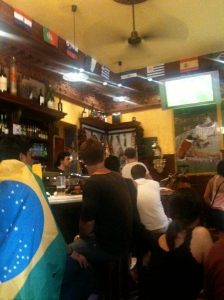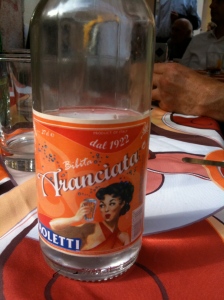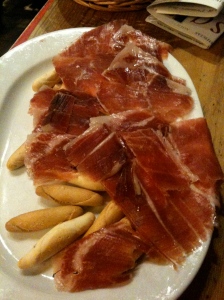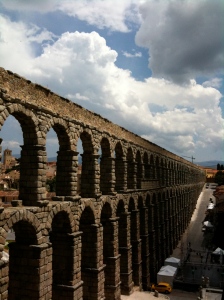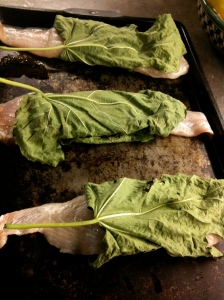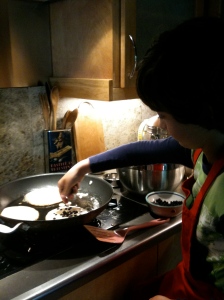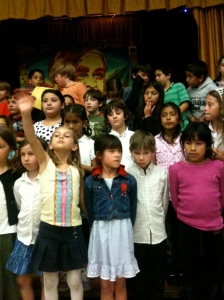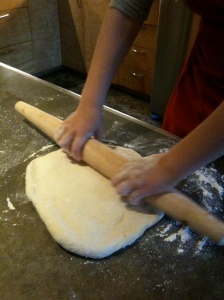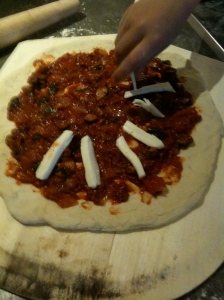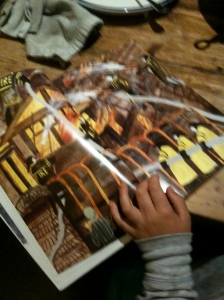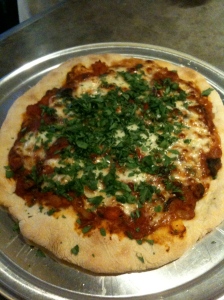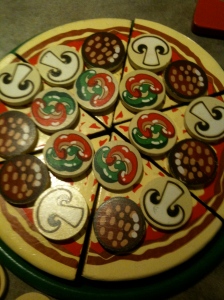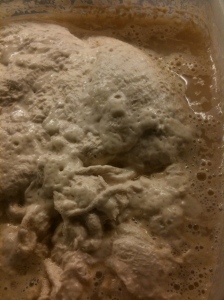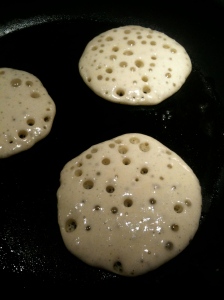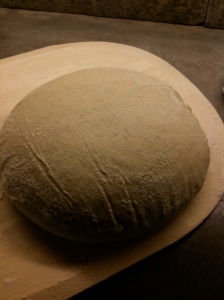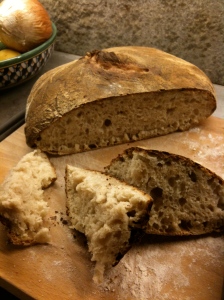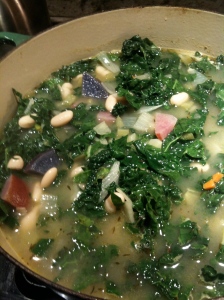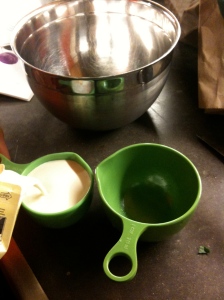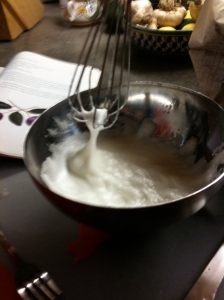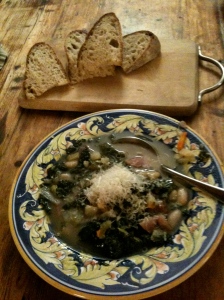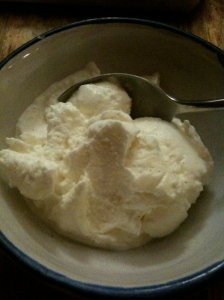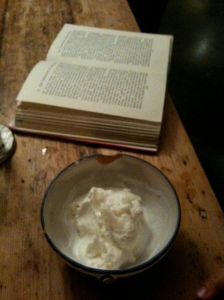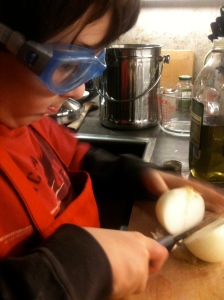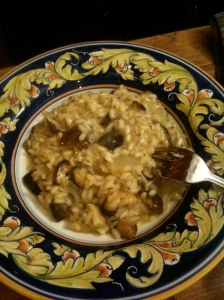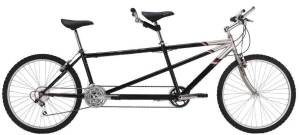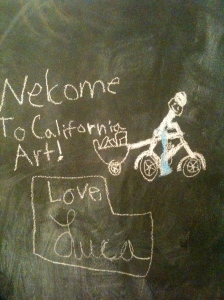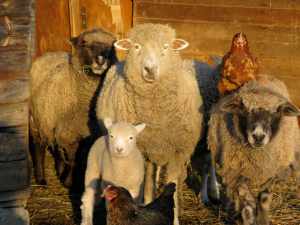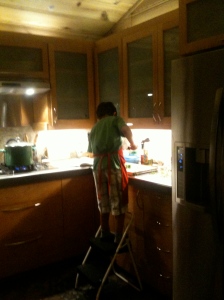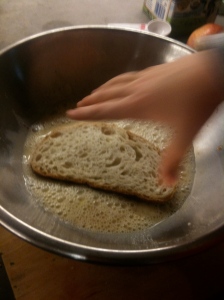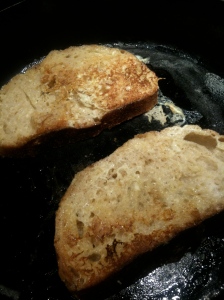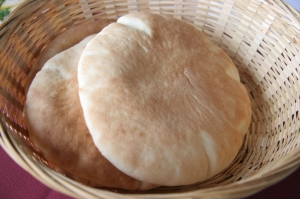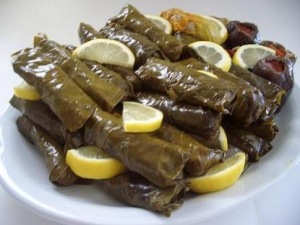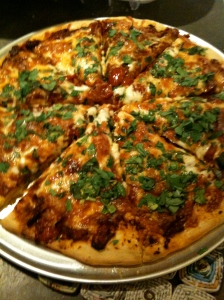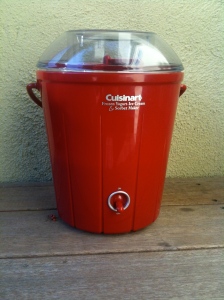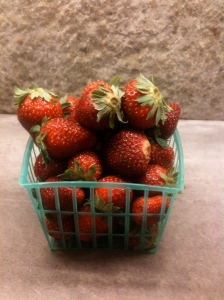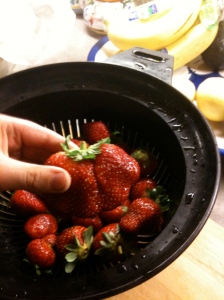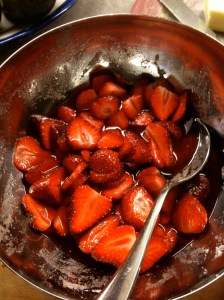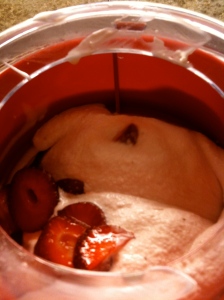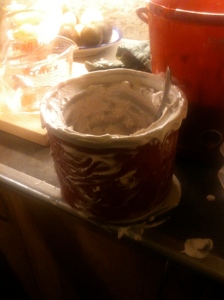Two Sundays ago, I woke to the smell of pancakes cooking. This never happens. The only time I smell pancakes in my house is when I am standing over the stove making them. Jim was just waking up. “Luca is making pancakes?” he asked groggily. In the kitchen Luca was at the stove. No longer in need of a step stool, he hummed as he poured fruit and nut pancake batter into a skillet. He even had the oven on at 200 to warm the plates. The pancakes turned out heavy and burnt, and tasted as though he hadn’t bothered to mix the ingredients. But still, he was cooking for fun, without any prompting or supervision. True inspiration!
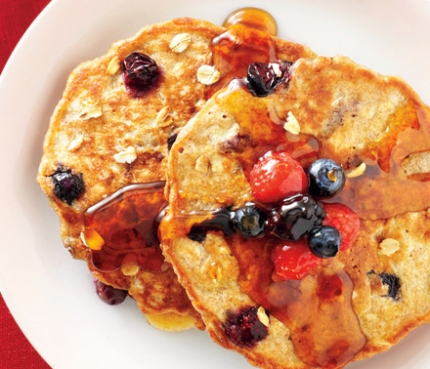
I didn’t take pictures of Luca’s burnt pancakes, so here is a photo from Epicurious of what they were supposed to look like.
It turns out that the pancakes were the beginning of what is a continuing burst of culinary zeal, prompted by the Epicurious app on Luca’s iPod touch. In addition to the pancakes, he has made an apple and yogurt “parfait” which is basically breakfast (fruit, yogurt, nuts) in a wine glass; a twist on a Cuban sandwich using turkey leftovers from Thanksgiving instead of pork; and a divine batch of chocolate chunk cookies he brought to a holiday potluck. He showed me his list of “favorites” on the Epicurious app and that he hopes to make soon: apple pie, turkey burritos with salsa and cilantro, bacon and potato frittata, banana, raisin and oatmeal pancakes, and bacon and avocado sandwiches. If he follows through on his plans I will have to go on a lot of steep hikes, but it will be worth it.
But why this sudden interest in cooking after so long? As the followers of this blog well know (and there are fourteen of you out there), Luca hadn’t so much as stirred a pot of soup or sliced a banana since April of 2011 after his return from Legoland. I have long since passed through all the stages of mourning for our time in the kitchen and the easy conversation that flowed as we measured and chopped and sautéed. Consoled by the idea that something must have stuck and that he wouldn’t go off to college afraid of boiling an egg, I have nevertheless expected nothing more from him lately than sprinkling salt on his food. And then I woke to the smell of pancakes. A miracle? Perhaps. Or, maybe to the problem of Luca losing interest in cooking one could say, “There’s an app for that.”
A few months ago, Luca began talking about saving up for an iPod touch. He wanted to play games, he said. Really? This was the same kid who declared all video and computer games “boring” and complained that most boys his age were obsessed with them and didn’t seem to enjoy doing anything else. Luca felt left out of playground games that centered on popular video games he knew nothing about. I worried that Luca was making himself an outcast, and worse, that it was my fault. When he was in kindergarten he asked me for a GameBoy and I said no. He could play those things at other kids’ houses, but we were not going to buy a gaming system. I immediately worried that I was setting him up for a grand obsession with the very thing I was denying him. But he never asked again, and to my surprise he never expressed any interest in video games. When other kids around him began playing more of them, Luca’s aversion to them only grew. It became so unwavering that I once found myself asking him if there wasn’t a game he’d like to play on the computer. “I hear Mine Craft is kind of cool,” I said, trying on moderation for size. “You make whole cities out of bricks and stuff.” I had no idea what I was talking about. Also, what was I doing pushing him down the slippery slope I had successfully averted years ago? I thought maybe Luca wasn’t any good at these games due to lack of practice and that was why he was so against them. But he said, “If I want to make something with bricks, I’d rather make it with real bricks, not bricks on a screen.” Inwardly, my heart sang. And yet, I worried that he’d suffer socially. Did I do this to him? Should I have let him play with more screens when he was younger? Now that it was becoming social currency, would it be too late for him to catch up?
A few months later, he was set on saving up for an iPod touch. “Why do you want one?” I asked. “Because they’re cool,” came the reply, and I couldn’t very well argue with that. His plan was to wash cars and windows for the neighbors and save up his allowance. But still, the cost of an iPod touch is upwards of $200 and I knew it would be out of Luca’s reach. Jim and I didn’t want him to lose the initiative, so we proposed to Luca that he earn the money to buy Jim’s old iPhone from us for $50. He wouldn’t be able to make calls or text, and internet access would be limited to Wi-Fi hotspots like our house. But games and apps could be downloaded just like on a brand new iPod Touch. Luca did some research and found out that with an easy iOS update the old phone would do just fine. He agreed to the deal (along with a set of ground rules), and a couple of months later our windows were cleaner than they’d ever been, Luca’s savings was depleted and he was the proud new owner of an old iPhone.
He began downloading games and apps with names like “Zombie Survival Handbook,” “Spy Gadgets” and “Zombieville 2.” Because both our devices are linked by way of my Apple account, all our apps are automatically added to both our devices which means that I discover (and promptly delete) apps on my phone that turn it into a light saber or tell me how to survive a Zombie apocalypse, while he has Epicurious and KCRW added to his.
Luca now spends some time on the weekends playing games on his phone, losing himself in fantasy parallel universes in which he is the head of Stark Industries or is claiming the Idol from the Temple in a deadly maze. He also listens to music, watches videos and takes pictures. He downloads images from Google to use as his wallpaper, checks the weather in various locations around the world (Hanalei, New York, Nuuk and Rio De Janeiro are a few of the regular cities on his weather app) and searches YouTube for videos of classical string players covering rock tunes (we are forced to listen to “Smoke on the Water” several times a day just like in 1972). He has an instrument tuning app, a metronome, a flashlight and one that simulates flight control. He has Hipstamatic and an app that finds the nearest In N’ Out Burger. Just this morning I found him with his headphones on watching Monty Python’s parrot sketch. (“Its’ not dead, it’s just pining.”) Not surprisingly he has become a devotee of all things Apple, and has declared that he wants to go to Reed College because that’s where Steve Jobs went. “Watch this,” he will say as he shows me how to categorize his apps into various files or add a password. Now Luca is the go-to person for all questions Apple in our house. Never mind that Jim works on an Avid all day. Luca knows how to do more cool stuff with our phones and laptops.
So did an app inspire Luca to cook? Or would he have gotten up that same morning burning with the desire to make us breakfast even if he had to search through our cookbooks for the recipe? Does it matter? When information that used to require a trip to the library can be accessed with the click of a mouse do we need to rethink how we define inspiration?
It’s not new – or even interesting anymore – to question whether we lose more than we gain from technology. There are a thousand ways to ask whether everything has become too easy. I find myself telling Luca variations of the “when-I-was-your-age-I-walked-ten-miles-to-school-barefoot-in-winter” stories in an effort to make him understand the nature of real motivation and drive. I am aware that I sound like an idiot when I’m saying this stuff to a kid who literally holds the world in his hand (his current wallpaper is a photo of Earth). If Luca wanted to go to school badly enough, would he walk there over ten miles in winter with no shoes? Would he walk at all, a couple of blocks even? The reality is that he gets a cushy ride to school every day listening to his favorite music station. So does it matter how he gets there?
If an app can make a kid want to make pancakes, can an iPod make a person want to compose a symphony? Do computers and apps unlock secret passions by making experimentation of all kinds relatively risk-free? Or are they creating a generation of kids who can flit from one thing to the next without making the minimal commitment? Now we can say “I want to try that,” and in a matter of minutes, or even seconds, we are editing a movie, recording a song or making fruit and nut pancakes. We can collaborate with people across the world without even getting out of our pajamas. Is this good? Should we ever be required to get out of our pajamas?
As parents we fear the cultural and social pressures to which our kids so easily succumb, only to rediscover again and again the faith that our kids’ most authentic selves can – and mostly do – survive them. Kids are who they are whether they are reading a book or a Kindle. There may be more ways to become distracted today than there were when I was growing up. But what drives a person to seek out knowledge – and cool new stuff – is as ancient as the hills.
Luca’s device has not dulled his intellectual curiosity any more than my lectures about the obstacles overcome by great people. “Uh-huh” Luca is probably thinking as he nods and pretends to listen. “Beethoven deaf, Mandela prison, Thomas Edison dyslexic. Got it.” He is waiting for me to shut up so he can put his face into his tiny screen and do a Google search for a digital model of Ancient Rome.
